 Here are two shots of Beth and me in book-themed masks specially made and sent to us by good out-of-state Hearts & Minds customers. Nice huh? Thanks, friends.
Here are two shots of Beth and me in book-themed masks specially made and sent to us by good out-of-state Hearts & Minds customers. Nice huh? Thanks, friends.
We are still not open for in-store traffic here in Dallastown. Covid-19 continues to spread in our area and we just don’t feel right about opening up our space. For one thing, there may not be enough ventilation in some of our several rooms.
We enjoy taking things out back to our yard by the rear parking  area, serving you al fresco. We can set up a card table and bring out all kinds of things you may want to consider.
area, serving you al fresco. We can set up a card table and bring out all kinds of things you may want to consider.
If your in the area and the weather is okay, give us a call at 717-246-3333. As always, we’re here 10:00 am – 6:00 pm, Monday through Saturday.
We are doing curbside pick-up and lots of phone consultations, responding to online inquiries and a large number of mail orders. Even though we miss our off site book displays, we’re glad to be in touch with so many of our on-line customers and mail-order friends. Thank you, thank you, thank you.
Keep supporting small and indie businesses that you appreciate — believe me, they need the business. I know we do. Stay well, support public health efforts, keep safe. In these hard days, read on!
***PLEASE NOTE: IF YOU ARE ORDERING MORE THAN ONE TITLE, PLEASE TELL US IF YOU WANT US TO HOLD UP ONE WHEN IT COMES OUT, UNTIL ANOTHER RELEASES, LATER, CONSOLIDATING THEM TO SHIP TOGETHER – OR – IF YOU WANT US TO SEND EACH BY ITSELF PROMPTLY AS EACH RELEASES. Notice the release dates we show and PLEASE LET US KNOW YOUR PREFERENCES.
***TELLING US HOW YOU WANT US TO SHIP IS VERY HELPFUL, TOO. AS WE SUGGEST AT THE ORDER FORM PAGE, WE RECOMMEND EITHER USPS MEDIA MAIL (which for one or two books is usually about $3.00, depending on the weight and size.) THIS IS CHEAP BUT SLOW – OR – USPS PRIORITY MAIL (which for one or several books is usually about $7.00 or so, depending on how many, but much cheaper than UPS, It is as quick or quicker that UPS.) PLEASE DON’T SAY “US MAIL” AS THAT ISN’T CLEAR. IT IS HELPFUL IF YOU STATE WHETHER YOU PREFER USPS MEDIA MAIL (again, cheap but slow) or PRIORITY MAIL (faster, but a bit more expensive.) WE CAN DO UPS BUT IT IS REALLY EXPENSIVE UNLESS YOUR BOX IS BIG AND HEAVY. THANKS FOR YOUR COOPERATION AS WE TRY TO SERVE YOU WELL.
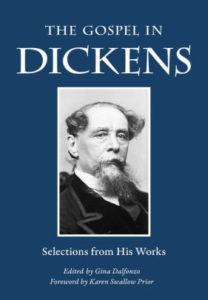 The Gospel in Dickens: Selections from His Works edited by Gina Dalfonzo (Plough Publishing) $18.00 OUR SALE PRICE = $14.40 Due September 22, 2020
The Gospel in Dickens: Selections from His Works edited by Gina Dalfonzo (Plough Publishing) $18.00 OUR SALE PRICE = $14.40 Due September 22, 2020
We gave a brief Victorian top-hat tip to this splendid forthcoming volume when we mentioned in the last BookNotes review of Gina’s other new book (Dorothy and Jack: The Transforming Friendship of Dorothy L. Sayers and C. S. Lewis) that just released. That one is fabulous and is a must for any fans of the Inklings, of course. But this Dickensonian one?
Well, it is one we are very excited about.
In fact, the good people at Plough Publishing — one of our favorite indie presses created by folks at the Bruderhof community who also publish the wonderful Plough quarterly — have helped us set up a Facebook Live event with Gina which I will host with special guest, literary rock star Karen Swallow Prior. How I’ve been considered qualified to join these two astute readers and writers to talk about one of the most legendary literary figures in all of human history, well, it just baffles me. But I’m foolishly game, so will serve as your intrepid host for an hour or so of conversation, insight, inspirational reading from the great Charles Dickens, and the opportunity to win an autographed copy of Dalfanzo’s brand new The Gospel in Dickens. I have offered to forge Saint Charles’s scribbly signature, but the morally impeccable folk at Plough didn’t go for that. It will be, happily, Ms Dalfonzo’s real signature.
You can sign up for this free on-line virtual launch party by registering at the Plough website: https://www.plough.com/en/events/2020/the-faith-of-charles-dickens
For those that may not know, Karen Swallow Prior, who wrote the foreword to this one, has written several books, including On Reading Well: Finding the Good Life Through Great Books (Brazos Press; $19.99) which we helped launch in the old pre-Covid days when we had actual in-store events. It will be fun to connect with the Notorious KSP again on Facebook Live. She’s been as busy as Gina these days, having recently edited and annotated beautiful and sturdy editions of Austen’s Sense and Sensibility and Conrad’s Heart of Darkness. She also co-edited the very useful Cultural Engagement: A Crash Course in Contemporary Issues which came out about a year ago. She’s especially eager to be in on this upcoming launch event with us because she wrote the introduction to The Gospel in Dickens.
Gina Delfanzo is very fine writer; her Dorothy and Jack, as I mentioned, is quite good and an important contribution to both Lewis and Sayers studies. She has what may be the best book on how churches can effectively and winsomely reach single folks in her 2017 book One By One: Welcoming Singles in Your Church. She blogs and offers other writerly pieces for the great “Christ and Pop Culture” website. And she knows her Dickens. Her choices for inclusion in this new volume illustrate her deep and wide fluency. There will be excerpts that some you most likely will expect. For many of us, though, some of these excerpts will be pieces we’ve never read before. It will surely whet your appetite.
This Gospel in Dickens book, by the way, is part of a larger series that Plough has done; you might be tempted to get the whole set, including The Gospel in George MacDonald, The Gospel in Dostoyevsky, The Gospel in Dorothy Sayers, The Gospel in Gerard Manley Hopkins, The Gopsel in Tolstoy. There are great touches in these well-edited compilations of meaningful excerpts by the famous author, not least the good introductions (J.I. Packer does the one on Dostoyevsky, altough they included a tribute by Malcom Muggeridge) and in some cases, artwork — woodcuts by Fritz Eichenberg enhance the one on Tolstoy. The one with pieces from Dorothy Sayers includes “An Appreciation from C.S. Lewis.” The one that includes selections from the poems, journals, letters, and spiritual writings of Fr. Hopkins has a forward by the former head of the National Endowments of the Arts, Dana Gioia. As you can see, this is a remarkable, affordable, series that carries a certain gravitas alongside the joy of reading some of best literature you will ever find.
And so, we invite you to pre-order this book (by clicking on the “order here” button at the very bottom of this column) and if you are able, join us for a celebration and good conversation with Gina Delfanzo, Karen Swallow Prior and me on September 22nd at 7:00 PM (EST.) We are grateful for your interest and support.
Join us for a celebration and good conversation with Gina Delfanzo, Karen Swallow Prior and me on September 22nd at 7:00 PM (EST.)
Again, to register for the Facebook Live event, click on the link above which will take you to the Plough Publishing website where you can let the know of your interest in attending.
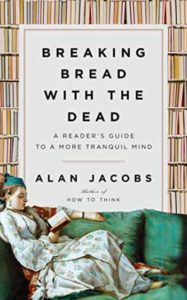 Breaking Bread with the Dead: A Reader’s Guide to a More Tranquil Mind Alan Jacobs (Penguin Press) $25.00 OUR SALE PRICE = $20.00 DUE September 8, 2020
Breaking Bread with the Dead: A Reader’s Guide to a More Tranquil Mind Alan Jacobs (Penguin Press) $25.00 OUR SALE PRICE = $20.00 DUE September 8, 2020
Well, speaking of the role of older books and significant literature, this is surely one of the books I’ve been most eager to see this year. And it is good, so good. About a year ago I had the great privilege of serving an Epsiopalian Church in the Philadelphia Diocese who had brought Alan Jacobs in to lecture on his extraordinary The Year of Our Lord: 1943 which should have won a Pulitzer Prize, in my view. During that morning of bookselling, Jacobs told me about this project he was working on and it was a true joy to hear a college prof (he teaches at Baylor University) reflect with empathy how so many of his students — perhaps more than before — struggle with anxiety and depress, not to mention distraction and a too frantic pace of life. He wondered if and how reading older authors who wrote about these same things (ha!) might help. Jacobs has two other volumes that are sort of in this genre of literary self help books, making a case for serious reading to help us cope with the perplexities of the modern age — The Pleasures of Reading in an Age of Distraction (Oxford University Press; $19.95) and How to Think: A Survival Guide for a World at Odds (Currenty; $24.00.) We used to take them everywhere we went when much of our business was doing off-site book displays. We will simply have to start mentioning them more here — they are tremendous for lovers of good essays, lovely for those who like good writing, and a life-live for most of us who, in this fast-pace world of social media quips and tweets and links and feeds, need to (re)learn the art of reading well and thinking well. Jacobs is a writerly mentor to us all and we can thank God for his work.
And so, Breaking Bread with the Dead helps us. As the publisher describes it,
In his brilliant and compulsively readable new treatise Breaking Bread with the Dead, distinguished professor and author Alan Jacobs shows us that engaging with the great writings of the past might help us live less anxiously in the present. Today we are battling too much information, a society changing at lightning speed, algorithms aimed at shaping our every move, and a sense that history is not a resource, only something to be vanquished. The modern solution to our problems is turn inwards, to surround ourselves only with that which is like us. Jacobs’ answer is just the opposite: to be in conversation with, and to be challenged by, the great thinkers of the past. What can Homer teach us about force? What does Frederick Douglass have to say about our difficulties with the Founding Fathers? And what can we learn from modern authors who are doing this work? How can Ursula K. Le Guin teach us to see the women of the canon differently? Breaking Bread with the Dead is a close reading with a gifted scholar of texts from across the ages… By agreeing to a conversation with the past, we can draw on more wisdom than the modern consciousness offers.
Here, now, I can only entice you with a few quick lines from others, hoping it will reassure you that this will be a few bucks well spent and a few hours that might be just exactly what you need — regardless of your age. But if you know any college students, it would make a great gift, especially for them, eh?
Alan Jacobs has given us a toolbox stocked with concepts that balance the pop of a self-help book with the depth of a college seminar. Breaking Bread With the Dead is an invitation, but even more than that, an emancipation: from the buzzing prison of the here and now, into the wide-open field of the past. –Robin Sloan, author of Sourdough
A provocative self-help book that challenges conventional wisdom about why we read and where it can bring us. We are distracted and today our reading, from link to link, has left us light. We need engagement and most of all, we need the grounding and weight from knowing our past. This elegant book moved me, especially when it led me to rethink time with my mentors and how they taught me, to paraphrase Wordsworth, what to love and how to love. On so many pages, I found things I know I will carry forward. –Sherry Turkle, Professor of Social Studies of Science and Technology at MIT, best-selling author of Reclaiming Conversation and Alone Together
Alan Jacobs captures the nervous joy of helping students discover that writers of “the long ago and far away” can mitigate the feeling of unmoored loneliness that afflicts so many young people today. Never scolding or didactic, Breaking Bread with the Dead is a compassionate book about the saving power of reading, and a moving account of how writers of the past can help us cope in the frantic present. –Andrew Delbanco, author of The War Before the War
A beautiful case for reading old books as a way to cultivate personal depth in shallow times. Breaking Bread with the Dead is timely and timeless — the perfect ending to the trilogy Alan Jacobs began with The Pleasures of Reading in an Age of Distraction and continued with How To Think. I’ve stolen so much from these books. So will you. –Austin Kleon, bestselling author of Steal Like An Artist
The title, by the way, of this great new hardback, comes from the poet and Christian convert W. H. Auden, who said that “art is our chief means of breaking bread with the dead.” Pre-order this or any other title you want by clicking on the order form link at the very end of this BookNotes post.
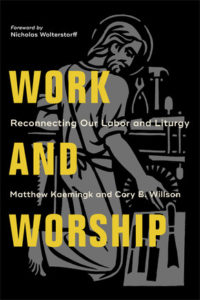 Work and Worship: Reconnecting Our Labor and Liturgy Matthew Kaemingk & Cory B. Wilson (Baker Academic) $29.99 OUR SALE PRICE = $23.99 Due November 17, 2020
Work and Worship: Reconnecting Our Labor and Liturgy Matthew Kaemingk & Cory B. Wilson (Baker Academic) $29.99 OUR SALE PRICE = $23.99 Due November 17, 2020
This extraordinary volume isn’t due until mid-November but since I am sending this BookNotes out on Labor Day weekend, I wanted to put this one up here near the top of my list of great forthcoming titles. It deserves to be high on your list, too. What a work of love and Christian scholarship, thoughtful and relevant, powerful and true. We need this book to be widely read and taken to heart. My own advanced reader manuscript — thanks to Baker for providing this to help me do my own job! — is dog-eared and highlighted and your volume will be to, I’m sure. It’s that good. And, to be honest, rare. Few books (even the many, many good ones on a theology of culture, a Christian view of culture, and the many or liturgical reform or deepening our view of worship) accomplish as much as this one does.
Since we serve church groups, pastors and worship leaders of various sorts, I suppose you know we have a large selection of books about church worship, about liturgy and gathered church. From contemporary to ancient (to those that combine ancient-future styles) we have a plethora of books about worship and resources for worship planning. But none do what this book does.
As I said at the Hearts & Minds facebook group yesterday, we are proud that we have done a good number of BookNotes columns offering lists of books about faith and work, about vocation, calling, careers and jobs. I’ve told some of my own stories of work history, offered a video clip of James Taylor singing “Millworker” and, of course, annotated dozens of books, Christian and otherwise. From deep reporting like the incredible Factory Man: How One Furniture Maker Battled Offshoring, Stayed Local, and Helped Save and American Town by Joanne Macy to luminous literary reflections like Finding Livelihood: A Progress of Work and Leisure by Nancy Nordenson to philosophical studies of blue collar work like Matthew Crawford’s remarkable Shop Class as Soulcraft to wise Christian standards like Work Matters by Tom Nelson, Every Good Endeavor by Timothy Keller & Katherine Leary Alsdorf, and Kingdom Callings: Vocational Stewardship for the Common Good by Amy Sherman (and so, so many more) we’ve offered more varied resources perhaps than any other store in America. Helping ordinary congregants of Christian churches relate their faith outside of the church walls, even at work on Monday morning, was one of the driving motivations for why we opened Hearts & Minds and curate the sorts of books we do.
Just when I thought we had enough books on this topic with not too much more to say, we celebrated the fun, provocative, insightful must-read paperback by my friend John Van Sloten, nicely called Every Job a Parable: What Walmart Greeters, Nurses, and Astronauts Tell Us about God (NavPress; $14.99.) It is laden with delightful insights drawn from John’s workplace interviews, pastoral care offered for his parishioners in their jobs, and sermons he’s done on how various jobs can reveal to us not only good stuff about God’s good world but about God’s own character. I’m telling you, this is the real deal and a great read.
We were delighted to honor Working in the Presence of God: Spiritual Practices for Everyday Work by Denise Daniels & Shannon Vandkewarker (Hendrickson; $24.95) as one of the best books of 2019 — released last fall, this is, again, a master work by someone who has worked in a variety of jobs and has thought deeply about a theology of and spirituality for the workplace. It’s now on my must-read list for those wanting a library on this growing body of literate and this frutiful twenty-first century mission field because it brings to us a thoughtful guide to work-related spiritual disciplines and practices (think of Tish Warren’s Liturgy of the Ordinary or Jamie Smith’s books on habits and cultural liturgies.)
The spiritual practices outlined in the book can be seen in these chapter-titles — The Liturgy of Commute, Workplace as Holy Ground, Surrendering the Calendar, Reading Scripture in Your Workspace, Affirmation of Calling, Gratitude for God’s Blessing, Celebrating Success at Work, Confession at Work, Lamenting Work, Solitude: Working in God’s Presence, Prayer of Examen for Work, and Sabbath: Ceasing from Work.
Good stuff, eh? It is a book that could be read in tandem with Work and Worship.
We frame this call to think Christianly about our careers and the practices of actually how to embody our ideas about serving God in the workplace by more general books on vocation and calling — from the likes of the upbeat Garden City by John Mark Comer to the gentle Let Your Life Speak by the Quaker Parker Palmer to the eloquent and profound The Call by Os Guinness to more general works (like, obviously, Visions of Vocation: Common Grace for the Common Good and the lovely little hardback A Seamless Life: A Tapestry of Love & Learning, Worship & Work by Steve Garber, and everything by Andy Crouch, especially Culture Making: Recovering Our Creative Calling and Playing God: Redeeming the Gift of Power.)
A uniquely Christian worldview or social imagination undergirds it all, so we routinely promote books like Transforming Vision by Brian Walsh & Richard Middleton, Creation Regained by Al Wolters, and almost everything by James K.A. Smith. In the last half of year I’ve been thrilled with fresh conversations about this missional vision of the meaning of public life found in great volumes such as The Symphony of Mission: Playing Your Part in God’s Work in the World by Mike Goheen & Jim Mullins and, even more recently, the stunning Exiles on Mission: How Christians Can Thrive in a Post-Christian World by Paul Williams.
Which brings me back to this invitation to pre-order Work and Worship: Reconnecting Our Labor and Liturgy by Kaemingk and Willson, releasing as a thick paperback in November. It is simply extraordinary, thoughtful, interesting, deeply aware, inspirational. It has tons of serious footnotes and while rooted in the neo-Calvinism of Kuyperian tradition (see the great foreword by Nicholas Wolterstorff) it is widely ecumenical. There are pictures of early church artwork, illustrations from Medieval woodcuts, sidebars of Puritan prayers, reprints of prayers for the global church, and photos of some modern-day churches that have done artful worship space designs honoring the gifts and callings and tools of the ordinary workplaces of the parishioners. Designed to help us think about how better worship might inspire more fruitful cultural engagement and work-world reform, it is for both professional church folks and worship leaders and those who, like most of us, spend our days outside of the congregational space.
I appreciate that right up front in the introduction,
While this is an academic work of theology, it does not subscribe to the traditional theory-praxis method (theology first, application second.) Instead, it takes the work of the people, their lives and labors, as its starting point for biblical and theological investigation and reflection.
I will surely be naming Work and Worship as one of the Best Books of 2020 and will tell you more about it later, as time allows. There are very few books like it, and none that take up this project as seriously as they do. For now, I offer these great endorsements by leaders in this whole movement of inviting conversation and equipping of folks for relating calling and careers, Sunday and Monday, liturgy and life, faith and work..
Read these endorsements carefully, and send us an order. It means a lot to us to sell books like this and we hope you’ll take us up on this opportunity for a very important reading experience.
“Here, finally, is the book that will take the ‘faith and work’ conversation to new depths of intentionality. With theological clarity and real-world accountability, Kaemingk and Willson mend what we have rent asunder. Advancing scholarship in theology of culture, it is also a must-read for those who lead worship for workers–which includes, of course, everyone. This should become a standard textbook, for the sake of the church and for the sake of the world.”
— James K. A. Smith, Calvin University; author of Desiring the Kingdom, You Are What You Love, and On the Road with Saint Augustine
“Kaemingk and Willson make an inspired contribution to the underdeveloped connection between work and worship in Christian life. They do not take the predictable approach of beginning with a theology of work and applying it to worship; rather, they come at it from the opposite direction, proposing that when references to labor are faithfully represented in the liturgy, it forms us for the work we ultimately present to God in all vocations.”
— Constance M. Cherry, Indiana Wesleyan University; author of The Worship Architect
“Born of years of deepening commitment and maturing insight, the great gift of this groundbreaking book is its remarkably rich study of Scripture and history, showing that the deepest, truest witness through the centuries comes from an understanding of liturgy and labor–which is surprisingly seamless. Work and Worship is a gift to the church.”
— Steven Garber, Regent College; author of The Seamless Life: A Tapestry of Love and Learning, Worship and Work
“In this beautiful and timely tome, Kaemingk and Willson argue quite persuasively and winsomely how work and worship were meant to be seamlessly coupled. They skillfully and methodically trace the rich biblical, theological, and historical foundation of this work and worship coupling across diverse people groups and cultures, ancient and modern. It is my earnest prayer that this book finally reunites and binds together–forever–these two vital segments of our lives.”
— Luke Bobo, director of strategic partnerships, Made to Flourish
You can order this easily by following the directions at our secure order form page. Just click on the “order here” link at the very. bottom of this BookNotes newsletter. Not much work at all.
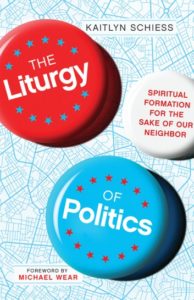 The Liturgy of Politics: Spiritual Formation for the Sake of Our Neighbor Kaitlyn Schiess (IVP) $17.00 OUR SALE PRICE = $13.60 Due September 6, 2020
The Liturgy of Politics: Spiritual Formation for the Sake of Our Neighbor Kaitlyn Schiess (IVP) $17.00 OUR SALE PRICE = $13.60 Due September 6, 2020
Well, if the above, ecumenically-minded book rooted in the neo-Calvinist tradition of Dutch Reformed “all of life redeemed” theologian Abraham Kuyper relates the formative power of worship to our understanding of work, relating liturgy and labor, then this book similarly asks what kind of liturgy can give rise to faithful citizenship. In a sense, to maintain my alliteration, it relates prayer and politics.
Like the topic of faith and the work-world, this, too, is a defining topic for us here at Hearts & Minds and I suspect we have more (and more varied) books about Christian views of politics and public life then nearly any Christian bookstore in the country. Again, our passion for seeing Christ’s own Lordship known and God’s own glory offered (done, or so the Bible says, by doing justice and loving others well) has been our motivation to stock books and write BookNotes columns on thoughtful, non-partisan views of faith and public justice, Christian views of statecraft and our citizenship. I’ve weighed in on a lot and you can use the search engine at our archived BookNotes reviews to see many important resources. My lefty friends think I read too much moderately conservative authors and my conservative friends think I’m way off base. As hard as that is (and it is!), we end up where we are often by reading about faithful efforts to integrate a Biblical social theology with the complexities of modern political life. We’ve been mentored mostly through organizations, magazines, speakers, conference, and books that offer this “neither left nor right” but distinctively Christian third way approach. I bet if yoiu are like me, you don’t hear your church telling you to honor God by being something other than what the current political imagination offers. (My own good church does implore us to be kind and socially involved, and I suppose yours at least does that. But we need more, much more.)
I often recommend Shane Clairborne’s colorful book Jesus for President: Politics for Ordinary Radicals (Zondervan; $19.99) for a healthy dose of Biblical politics but as I sometimes say, Jesus isn’t running this year. Which leads us to harder thinking about social ethics and public theology and — if we want to “take every thought captive” (2 Corinthian 10:5) and not be “taken captive” by worldly ideologies (Colossians 2:8) then we have to dig into the deeper political theories that shape the main movements of our time and learn to be discerning about what is consistent with Biblical truth about the nature of things civic. David Koyzis’s Political Visions & Illusions: A Survey & Christian Critique of Contemporary Ideologies (IVP Academic; $33.00) is hefty and a bit deep but the go-to book on this very thing. It is exceptionally important. James Skillen’s The Good of Politics: A Biblical, Historical, and Contemporary Introduction (Baker Academic; $24.00) offers a comprehensive look at how different Christian theologians and thinkers and leaders down through the ages have viewed the task of the state; if we want a Christian perspective we have to do this kind of interpretive work about this central matter: what is God’s good gift of government supposed to be doing? I’ve often said that one of the most useful resources to get a process of developing a wise and prudent and Christianly conceived policy platform is Ron Sider’s excellent Just Politics: A Guide for Christian Engagement (Brazos Press; $24.00.) In other BookNotes columns I’ve recommended some that offer debate between those with different views so you can sort through the various options on offer within the Christian tradition, at least being informed of legitimate options.
I share these reminders now because I want you to know what some of the best, most foundational books are in this particular (political) field and to suggest this, too: most of us don’t have pastors or preachers or worship services or prayer groups that are significantly informed by any of this. Congregations I know are mostly a-political, not really underscoring how our liturgy effects life, how our prayers shape us into citizens. Some do have a missional sort of scope of vision but just tend to tilt left while some tilt right; not too many seem very intentional about a deeply integrated Biblical orientation that might give rise to what might be fairly called Christianly faithful politics.
The brand new book by Kaitlyn Schiess fits into this conversation, I think, of longing for a better way to think faithfully about public life and political culture than (as is too often the case) to merely mirror either the right or the left or muddled middle. It calls us to fresh thinking and faithful public witness. One of the chief assumptions is that many younger adults, especially, are just weary of the political legacy they’ve inherited with their churches and they hunger for a better approach. At least that is what it says boldly on the back cover.
The Liturgy of Politics isn’t just a shrill protest about the religious right or the often goofy ways some Christians (without much intentionally Christian insight praise) MAGA and Trumpian power. That is fairly low-hanging fruit and we need more. No, this author is digger deeper, asking why it is that many of us (left, right and center) have adopted values and assumptions and habits of heart and practices about civic life from the political culture itself; we have allowed ourselves to somehow be taken captive and fundamentally shaped in our public views and attitudes by forces other than the gospel. If you’ve read even the first part of Jamie Smith’s You Are What You Love you’ll recognize some of her argument. If you appreciate even some of Jim Wallis’s recent Christ in Crisis? Reclaiming Jesus in a Time of Fear, Hate, and Violence I think you’ll see what she is getting at; we resort to political views and parties without much consideration of how the Bible itself and Jesus Himself informs those choices. Our misguided and unfaithful citizenship is an example, she shows, of inadequate spiritual formation. We’ve not lived into the hope of Romans 12: 1-2, and a few motivational sermons to get involved or finger wagging exhortations aren’t going to have the gospel-centered, transformative impact we need.
Of course if you were one of the many who expressed enthusiasm for the (&) project and the recent release of their wonderful Compassion (&) Conviction: The and Campaign’s Guide to Faithful Civic Engagement by Justin Giboney, Chris Butler, and Michael Ware (IVP; $22.00) you will understand more of why we so urgently need to examine our faith and spiritual formation practices so we can become the kind of people who live well in the public square and vote their consciences in light of the Biblical principles of public justice. I think many of us are wishing for fresh insights about the mess we’re in and what to do about it. Michael Wear, in fact, wrote the foreword to The Liturgy of Politics.
Here is what Matthew Kaemingk (author of the forthcoming Work and Worship) says of The Liturgy of Politics:
I hope you get this new book for yourself as a citizen. I hope you suggest it to your Bible study or prayer group. I hope you get it for your preacher and your spiritual director, too, if you’ve got one. If you know any worship leaders, they need it. This really is a key work on the importance of intentional church life, disciple-making, good worship, and spiritual formation practices that are for the world and help us with better engagement with our political system.
I mentioned above one of my mentors in all of this, the brilliant James Skillen, founder of the Center for Public Justice. He says “read this book now!” Jim doesn’t endorse many books, but here is what he nicely says about The Liturgy of Politics:
This is a powerful challenge from a young heart and a mature mind. Schiess seems to touch every unexamined habit of Christian thought, work, leisure, and worship. With a wide sweep of life’s liturgies and church liturgies, of spiritual formation and political responsibility, of Bible reading and communication with others, Schiess goes straight for the heart in relaxed conversation that packs a prophetic punch about our complacency, ignorance of Scripture, cultural conformity, and more. Her urgent message is for communities of Christian faith to repent and turn ourselves over entirely to God, as disciples of Jesus Christ have always been called to do. It is hard to imagine how this young woman has been able to read so widely and think so profoundly about so much of life. Here you’ll find fresh insight and compelling hope that will renew your labors for the coming of God’s kingdom. Young people, old folks like me, and everyone in between, read this book now! —James W. Skillen, author of The Good of Politics, former president of the Center for Public Justice
Skillen is right — she has thought well about a lot and her footnotes are simply spectacular. She’s read a lot and cited all kinds of authors. Wow. This is quite a book. Order it today by scrolling down to our “order here” button at the end of this column. It’ll take you to our secure order form page. Fill in the info. We’ll send your book out right away.
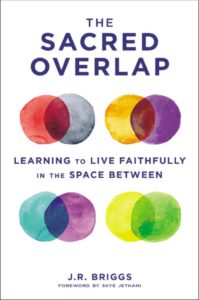 The Sacred Overlap: Learning to Live Faithfully in the Space Between J.R. Briggs (Zondervan) $19.99 OUR SALE PRICE = $15.99 Due September 8, 2020
The Sacred Overlap: Learning to Live Faithfully in the Space Between J.R. Briggs (Zondervan) $19.99 OUR SALE PRICE = $15.99 Due September 8, 2020
Oh, how glad I was to get an early copy of this and be given the opportunity to take a look. J.R. is an energetic church leader, founder of Kairos Partnership, an excellent author of several great books, and a friend of Hearts & Minds. That he wanted to send some of his fans and readers our way means so much. What a great “sacred overlap” between author and booksellers. We are jazzed, honored and energized to think of this simple partnership, an overlap of sorts.
Well, that may be a bit allusive, but here’s my point for saying that, other than to affirm that we feel close to this author and his brand new book. The book is (among other things) about that nearly mystical sense of overlap, of God’s ways and our own, of God’s Spirit and the ordinariness of daily life. It is about embodiment, living in the real world, and yet realizing — on our good days, thanks to God’s active grace in our lives — a holy sense of God’s own presence. We don’t have to choose between the ordinary stuff of the quotidian and the spiritual, say, but can honor the mystery of both/and.
Picture one of those Venn diagrams like on the colorful cover, two circles, maybe think of the Earth and Heaven, or, in common parlance, the secular and the sacred. Think about our daily experiences, fine and bad, meaningful and crappy. And think about God’s realm, glorious and good. Might those two circles overlap? A little? Can we live with one foot in this world and another in the new creation that is yet to come? Might the future break into the present?
Of course, Jesus is the One in which we see the fully human and fully divine combined most clearly. He is the sacred overlap par excellance. And he made this world and is alive and well, reigning over it, even as the promise of newness is yet to be fully seen; we all know in our bones that things are not as they are meant to be, as they someday will be. It’s both/and, Kingdom come and Kingdom yet to come.
Christians at their best honor the glories of creation and the wonder of this good world and want to even affirm that it “declares” the God’s speech, as Psalm 19 puts it. But we are not pantheists; we do not worship the creation, but the Creator. (By the way, I think it is a cheap shot offered by some that those Christians who take seriously the Biblical call to care for the earth, to steward well and even celebrate our oneness with all created things are thereby pantheists; I am confident that most of those Christians working for sustainability and against climate change are not pantheists. We care about creation because God does; one only need recall Psalm 96 or John 3:16 or Colossians 1:16 to be reminded of this. We find spiritual motivation to enjoy the outdoors and to be vigorous in protecting the Earth from those that want to hurt it, but that doesn’t mean we worship it. It’s a cheesy, mean-spirited cheap shot and those that have made it — usually those on the Christian right who claim to believe the Bible but on this score seem not to have read it very carefully — ought to ponder God’s redemptive love for and presence among the creation itself. We attend to the glorious creation and we worship the Creator; it’s not either/or but both/and.
I use this example to suggest that we all could use a refresher course on the relationship of Heaven and Earth, the divine and the commonplace, the spiritual and the mundane, and JR Brigg’s new book is a unique and fruitful way to accomplish this. The Sacred Overlap: Learning to Live Faithfully in the Space Between is fun and interesting and learned and missional, it’s firing on so many pistons and raising so many fascinating matters that I cannot think of a reader who won’t enjoy it and be edified by it. It’s a call to wholistic living, honoring both/and approaches and wholistic practices. It will help you “embrace the tensions of living in two worlds” as he puts it
Two worlds? Well, not exactly — we live in one world but our experience is both temporal and eternal, profane and sacred. Jesus said the Kingdom is here, but yet told us to pray for it yet to come in fullness. Some call this the “already but not yet.”
At the very least, to get at this paradoxical truth, we need Briggs’s reminder that a radical trust in God (and a radical love for others) emerges best from a perspective that is less either/or but embracing both/and.
Jen Pollock Michel wrote an award winning book on this exact thing (Surprised by Paradox: The Promise of And in an Either/Or World) and it’s great to see her lively endorsement on the back of Sacred Overlap. She writes:
To embrace both/and faith is risky—and rewarding— business. It’s risky for those who prefer control to trust, simplification to nuance. It’s rewarding for those who appreciate just how much surprise is involved in following Jesus. The Sacred Overlap will prove immensely helpful for both personal discipleship and corporate mission.
Briggs writes,
Read the gospels and you’ll see how Jesus was committed to crossing cultural, social, political and religious either/or waters, engaging in many and/also activities. He comforted the disturbed and also disturbed the comfortable. He was too religious for the pagans and also too pagan for the religious elites. He hung out with filthy lepers and also dined with the filthy rich. He was alarming and disarming at the same time.
Maybe this “both/and” worldview can help us not only get beyond the debilitation “sacred vs secular” dualism that plagues us, but can push us into the public square with a gracious and ground-breaking, ground-finding mission of reconciliation. We can embrace words and deeds, so to speak. We can become, like Jesus, a “scandalous misfit” (as JR puts it) “hanging with saints and sinners.” With wit worthy of one of his mentors, Leonard Sweet, je says we can all “double major” — embracing justice and grace. Our faithful presence, shaped by a realization of a sacred overlap, can perhaps offer a healing balm which our country so badly needs, allowing us to embrace the tension of both conviction and civility. A deep appreciation of a sacred overlap allows us to be surprising, unexpected, refreshing, even. (It is no surprise that the Fresh Expressions church planting movement is part of his backstory.) This rejection of either/or, line-in-the-sand binaries and a creative embrace of “the space between” is bound to bear good fruit, in our own personal growth and in our ministries and public witness.
Here is what author Tod Bolsinger says:
“This book should be read by all those who want to be formed into someone who can personally participate in crossing divides and working for a genuinely restorative common good—and are willing to have their assumptions challenged every step of the way.”
Pre-order this book today by clicking on the order form link at the end of this BookNotes column. If the book is right, it will be a religious experience, with a divine overlap between commerce and spirituality. And if that is so, who knows where it will all lead. As Len Sweet says of Sacred Overlap, “J.R. Briggs has written the book we have been waiting for.”
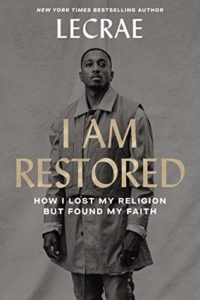 I Am Restored: How I Lost My Religion but Found My Faith Lecrae Moore (Zondervan) $26.99 OUR SALE PRICE = $21.59 Due October 13, 2020
I Am Restored: How I Lost My Religion but Found My Faith Lecrae Moore (Zondervan) $26.99 OUR SALE PRICE = $21.59 Due October 13, 2020
I can hardly think of another figure in pop culture who represents some of the best impulses these days of culturally-savvy evangelical faith than the writing, speaking, activism, and music (recording and performance) of the hip hop artist known as Lecrae. Lecrae is, to be honest, more thoughtful and well informed and mentored than many Christian pop music stars and celebrity worship leaders, some who wouldn’t read a book if their life depended on it and spout all kinds of bland nonsense on stage and even on their records.) I respect Lecrae and know he has been deeply influenced by some of the very books and theological traditions I’ve mentioned above (see my prelude to the description of Work and Worship, for instance, where I mention Al Wolter’s Creation Regained or Andy Crouch’s Culture Making, etc.) As a black man of informed, serious faith in the hip hop culture (and within the predominantly white, evangelical youth and young adult subculture) Lecrae has navigated things well. His first book, Unashamed is powerful and inspiring in many ways.
I Am Restored, I am told, is every bit as good, perhaps an even more riveting read. It explores his own past, his own experiences of abuse and trauma. (I think of the amazing, unforgettable, vulgar, tender, memoir by Laymon Kiese, entitled Heavy: An American Memoir.) I know Lecrae in his forthcoming book will talk about his own pain, his doubts, his reading of Reformed theology, his involvement with various sorts of religious organizations; he will surely talk about BLM; he will offer insights about his own fears and struggles, about therapy and self-care, even in these hard times.
If you want to get this as soon as it is released, use our order form which is found at the end of this column. The “order here” takes you to our secure order form page where you can follow the directions about safely entering credit card info and we’ll take care of the rest.
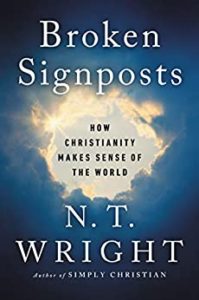 Broken Signposts: How Christianity Makes Sense of the World N.T. Wright (HarperOne) $27.99 OUR SALE PRICE $23.39 Due October 6, 2020
Broken Signposts: How Christianity Makes Sense of the World N.T. Wright (HarperOne) $27.99 OUR SALE PRICE $23.39 Due October 6, 2020
I have not yet seen this although I will say without hesitation that this should be on the stack of anyone who is a reader of books about our cultural malaise, about how to understand our moment in social history, and, more, about how the gospel of Christ’s Kingdom can offer a compelling and relevant explanation for our world. Certainly if you are into apologetics you need this. If you want good but accesible writing, a serious but popular level apologetic that is astute about society, about the human heart, about the Biblical worldview and about the Gospel of John (especially, in this one) this book is a must-have. You should pre-order it from us today. As much as I truly appreciated his great little volume God and the Pandemic that came out a few months ago (best read in tandem with Walt Brueggemann’s brief but amazing Virus as a Summons to Faith) many of us have been waiting for this particular project for a long time. It is a sequel to his excellent Simply Christian: Why Christianity Makes Sense.
To explain Broken Signposts I should remind you about Simply Christian.
Simply Christian: Why Christianity Makes Sense, you should know, is designed for those who are inquirers to the Christian faith, seekers and skeptics (or, probably more realistically, those who want to enter into better conversations with post-Christian seekers and skeptics.) I have suggested it often as it does, intentionally, what C.S. Lewis does in Mere Christianity, with several unique improvements.
One significant difference, is that the middle portion of Simply Christian is a good overview of the entire Biblical story. Unlike Lewis, Wright is a Bible teacher and the Word is central to his argument that that Story, the drama of Scripture itself, gives an account for and offers meaning into, our own stories, our lives, such as they are.
Secondly, there’s this: C.S. Lewis is famously making an argument from our lived experiences, our longings and desires and wishes and aches. There must be more to life if we sense some longing; there must be some ultimate Home if we all experience some profound homesickness. He writes in lovely prose about his own sweet home with lots of books and big cups of tea. Don’t we all want to be back to that safe place and is not that exact wistful longing some signal of transcendence? That is, if there is a place we long for, maybe there is exactly such a place. Maybe the call we hear from home is coming from a real Caller. God and heaven are most likely real because we are seem wired for this wishful thinking, this near universal desire for Something, based on some memory wired deep within us..
This is all well and good (and it is!) except here’s the thing: few postmodern, contemporary readers feel about their homes the way Lewis in the early-mid 20th century felt about his. The concern is more complicated than this, but many college-age young adults have told me — I bet they’ve told you if you’ve had this kind of conversation with them, which I hope you have — that Mere Christianity just doesn’t cut it. They do not resonate with it, as some may say. Others are enraged by the assumptions that home was a safe haven and that God is a good daddy; this is not their experience, in their childhood homes or in this culture. Lewis’s elevated prose and classical arguments made with these pleasant images may have worked for certain sorts of readers in earlier times but it is increasingly obvious that many can’t go there nowadays.
Enter Tom Wright with his version of Mere Christianity, Simply Christian, first published in 2010. NT Wright suggests that Lewis (whose books were very important in his own coming to faith, by the way) is correct — we are built for something, we are wired, so to speak, we hear echos of deep meaning coming from somewhere or Someone. But the deep, nearly universal instincts that give us these longings are not about homesickness for our quaint British home with lovely tea; it is our longing for justice. Is that not the cry of every child — “That’s not fair!”? Where does that come from? And it is for our aching loneliness and anxiety — our longing for good relationships. Do we not all long for healthy relationships? Is this not why debates about sexuality and LGBTQ+ persons, these days, are so tender and wrought — we all long for intimacy and it is so very, very close to the bone for us all. (I suppose it isn’t true for all of us but as the singer of The Head and the Heart sings in the song “Gone” from their album Let’s Be Still, “We wear our broken hearts on our sleeves.”) Another key “signal of transcendence” that Wright explores in Simply is especially powerful after 9-11 and the rise in global terrorism and mass shootings (perhaps now experienced also as a fear of global pandemics) and that is the longing for security. We all want to be safe, free from persecution and war and danger. And then there is beauty. Who among us doesn’t gasp at a beautify sunset or double rainbow or other exquisite scenes that conjure up an innate appreciation for beauty.
These are the signals or signposts that point us to a reality that, in fact, honors these universal human longings and can explain why they are there and how they went so very badly for so many of us. Our very lived lives in the world God has made points us to the plausible truth of the Biblical teachings about a good creation that went sinfully wrong but that is being answered, redeemed, healed, renewed. (Or as Wright often says in his British way, “sorted out.”)
In the words of Dallas Willard, we told that “N.T. Wright is uniquely qualified to convey the enduring substance of Christian life and thought to contemporary people.” J.I. Packer, called this book “brilliant” said “Bishop Wright is one of God’s best gifts to our decaying Western church…”
And, now, in Broken Signposts: How Christianity Makes Sense of the World he does it again. I’m told Wright expands his “signposts” to seven (adding longings for and experience of freedom, truth, and power) and insists that every worldview must somehow given an account of these “indicators” that are “inherent to humanity.” Why do we long so for right experiences of these things? Using the Gospel of John as his main source, he shows how Christianity defines each signpost and shows why we so often see them as being “broken.” And what good news there is about what can and will be done to “sort it all out.”
As the publisher has promised:
Drawing on the wisdom of the Gospels, Wright explains why these signposts are fractured and damaged and how Christianity provides the vision, guidance, and hope for making them whole once again, ultimately healing ourselves and our world.
Pre-order this now at our discount price using our link to our secure order form page at the bottom of this column. We are grateful.
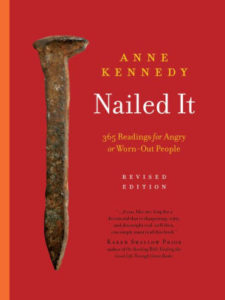 Nailed It: 365 Readings for Angry or Worn-Out People (Revised and Expanded) Anne Kennedy (Square Halo Books) $27.99 OUR SALE PRICE = $22.39 Due late October 2020
Nailed It: 365 Readings for Angry or Worn-Out People (Revised and Expanded) Anne Kennedy (Square Halo Books) $27.99 OUR SALE PRICE = $22.39 Due late October 2020
Do you want a daily devotional that isn’t, um, overly sweet and full of religious cliches? Want a collection of daily meditations that is as messy and complex and (at times) funny as the Bible itself actually is? Are you maybe tired of the worn sentiments of evangelical faith but need some boost that isn’t off-the-charts sacrilegious. Well, do we have good news for you.
Anne Kennedy, allow me to say, is one heckuva writer. She’s snarky and sarcastic and witty and bold. And, as any reader can tell, loves the God of the Bible revealed in Jesus the Christ. That is, she’s precise and faithfully orthodox in theological concerns that matter most. But let’s face it, sometimes those who are most seriously committed to good theology are nearly insufferable. And sometimes devotionals can almost make things worse, seemingly unaware of our deep hurts, our anger, and our need for something more real and raw. They writers are often lovely and spiritually mature, but we get bored.
Nailed It was a vibrant collection of Biblical reflections that was previously published by the distinguished by now defunct Kalos Press. Kudos to them for recognizing Kennedy’s good writing and taking a risk or putting out this fiesty anti-devotional. And Kudos to my pals Ned & Leslie Bustard over at Square Halo Books for seeing something there that needed to be preserved. They bought the rights to this, commissioned her to create new content to make it into a volume with a year’s worth of entries, gave it a striking new cover — the previous drawing of Jael in Judges maybe was a bit much — and we now have one of the great new devotionals for 2020. We hear it will be available in mid-to-late October; with the Covid complications and supply chain disruptions who knows exactly how smaller, indie presses can get their stuff out there? We invite you to get this in order to support this artful, sound, publisher.
I like this endorsement by Karen Swallow Prior:
If you think the Christian life is one precious moment after another, you should read this book. And if you think the Gospel is all pap and saccharine, you really should read this book. But if you, like me, long for a devotional that is sharpening, witty, and downright real, well then, you simply must read this book. You will never see the story of the Bible-or your own place within that story-the same way again. Karen Swallow Prior, Ph.D., Author of On Reading Well
Don’t ya love the little snipe at “precious moments.” Well done, SKP; you’ve been reading Anne Kennedy, I see.
Anne Kennedy, by the way, has a B.A. from Cornell University and an M.Div. from Virginia Theological Seminary. She grew up in French-speaking West Africa and traveled all over the world, only to find herself now living in upstate New York, where she mothers her six young children and helps her husband pastor a small Anglican church. Anne blogs at Patheos.com.
Use our button at the end of this BookNotes column to be sent to our secure order form page here at the bookshop in Dallastown. Pre-order it now at our 20% off discount. Then, after you hit send, cry, “Nailed it.” Okay, that was dumb. But, let’s face it, you can’t do that part over the phone.


The Monster in the Hollows: The Wingfeather Saga Book 3 Andrew Peterson (Waterbrook Press) $13.99 OUR SALE PRICE = $11.19 Due October 6, 2020
The Warden and the Wolf King: The Wingfeather Saga Book 4 Andrew Peterson (Waterbrook Press) $13.99 OUR SALE PRICE = $11.19 Due October 6, 2020
Oh my, the new editions (Books 3 and 4) of the Wingfeather Saga are soon to be released and many of our early/middle elementary age and older customers have been waiting and waiting. (Some of those awaiting are quite a bit older, actually, as these kid’s fantasy books really do have a wide appeal.) You may know that they were written by the multi-talented singer songwriter Andrew Peterson, the head bunny at Rabbit Room. They were, for a while, done in paperback by the cool and very indie Rabbit Room outfit. (You may know their publishing work best for doing the exquisite and very blessed leathery Every Moment Holy prayer books, the large and the small editions, both which we carry, or the lovely leather bound edition of The Light Princess which we’ve reviewed at BookNotes when it first came out.) Andrew Peterson is a thoughtful and good writer and a great individual and we’re delighted that this major publisher picked up and are re-doing all four of the main Wingfeather books. (The previous Book Five, Wingfeather Tales: Six Thrilling Stories from the World of Aerwiar (which we still have in paperback, by the way) will be reissued in hardback in March 2021.)
As we explained at BookNotes back in the early spring when Book 1 and Book 2 were reissued by Waterbrook (that’s On the Edge of the Dark Sea of Darkness and North! or Be Eaten) the fantasy-world stories are not changed from the originals. The re-set type font is a bit better, the black & white illustrated artwork, I think, is better, and they are now casebound (sans dust jacket) hardbacks. At the same price as the old paperbacks. Yay. These are great, fun, adventurous reads and we do recommend them. You should have all four!
Just scroll down to below our logo and click on the “order here” button which will take you to our secure order form page. You can tell us what you want and how you want it sent. Easy.
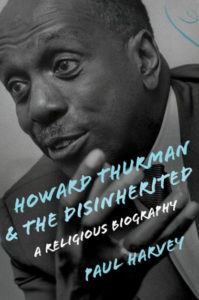 Howard Thurman and the Disinherited: A Religious Biography Paul Harvey (Eerdmans) $28.99 OUR SALE PRICE = $23.19. Due October 27, 2020
Howard Thurman and the Disinherited: A Religious Biography Paul Harvey (Eerdmans) $28.99 OUR SALE PRICE = $23.19. Due October 27, 2020
I could spend much time typing out for you how important Howard Thurman was (and is) as one of the chief thinkers and spiritual writers that fueled the leaders of the Civil Rights Movement. Those who know even a little of Dr. Martin Luther King, Jr. will know that Thurman was important to him, King’s own ragged copy of Jesus and the Disinherited often carried with him from study to march, pulpit to hotel, church to protest. It remains a very important book and we are always glad when folks order it from us.
Dr. Thurman was a very significant leader in mid to late 20th century black culture. Ebony Magazine, I believe, named him one of the top 50 most important figures in African American history. Naturally, there are several books about him, including his own autobiography that we carried soon after we opened and still stock entitled With Head and Heart.
This forthcoming one by the insightful Paul Harvey is, I predict, going to become known as the standard, the gold-standard, of biographies of the great leader.
And what a book it is. Thanks to a helpful Eerdmans staff member, I got an early draft of the manuscript and it is excellent. Publishers Weekly raved with a starred review. The author seems to really capture the various sides of the complicated Thurman, known variously as a mystic and activist and theologian and institutional leader. He was the dean of the chapel at Howard University, a chaplain at Boston University (1953-1965), met with Gandhi, wrote for the Quakers, spoke out in favor of nonviolence, planted an interracial church in San Francisco, became a mentor to King and others, and eventually took other leadership roles.
I appreciate Harvey’s good writing and his sensitivity to these various roles, Thurmans inner life and spirituality, his passion for the poor, his articulate hope for a just and meaningful faith for the modern culture. Dr. Harvey is obviously fluent in this material and has been studying this topic for a long time. More than a decade ago he published the provocative and widely reviewed The Color of Christ: The Son of God and the Saga of Race in America. That he has done this work, now, is a major contribution. I like what the publisher says:
Few historical figures represent such diverse parts of the American religious tradition as Howard Thurman did. By telling the story of his religious lives, Paul Harvey gives the reader a window into many of the main currents of twentieth-century American religious expression.
Howard Thurman and the Disinherited: A Religious Biography by Paul Harvey is part of the very highly-regarded seres of religious biographies published over the years by Eerdmans. The list of this series is remarkable and the biographers are most often historians who are respected in their fields. I’m very excited about this important new release. It will be good for anyone interested in the civil rights movement, the spiritual formation of mid-20th century black intellectuals like King, and, further, for how this living tradition of gospel-based and deeply spiritual lives can motivate and shape those who are servants of the public good, or, as King put it, extremists for love. Very highly recommended. You can pre-order it by clicking on the link that says “order here” below. Thanks.
PLEASE NOTE; IF YOU ARE ORDERING MORE THAN ONE TITLE, PLEASE TELL US IF YOU WANT US TO HOLD UP ONE WHEN IT COMES OUT, UNTIL ANOTHER RELEASES, CONSOLIDATING THEM TO SHIP TOGETHER –OR- IF YOU WANT US TO SEND EACH PROMPTLY AS IT RELEASES. PLEASE LET US KNOW YOUR PREFERENCES.
LETTING US KNOW WHICH METHOD OF US MAIL YOU’D PREFER WOULD BE VERY MUCH APPRECIATE. DO ASK IF YOU HAVE ANY QUESTIONS AS WE’RE HAPPY TO HELP.
BookNotes

SPECIAL
DISCOUNT
20% OFF
ANY BOOK MENTIONED
+++
order here
this takes you to the secure Hearts & Minds order form page
just tell us what you want
inquire here
if you have questions or need more information
just ask us what you want to know
Hearts & Minds 234 East Main Street Dallastown PA 17313
read@heartsandmindsbooks.com
717-246-3333
